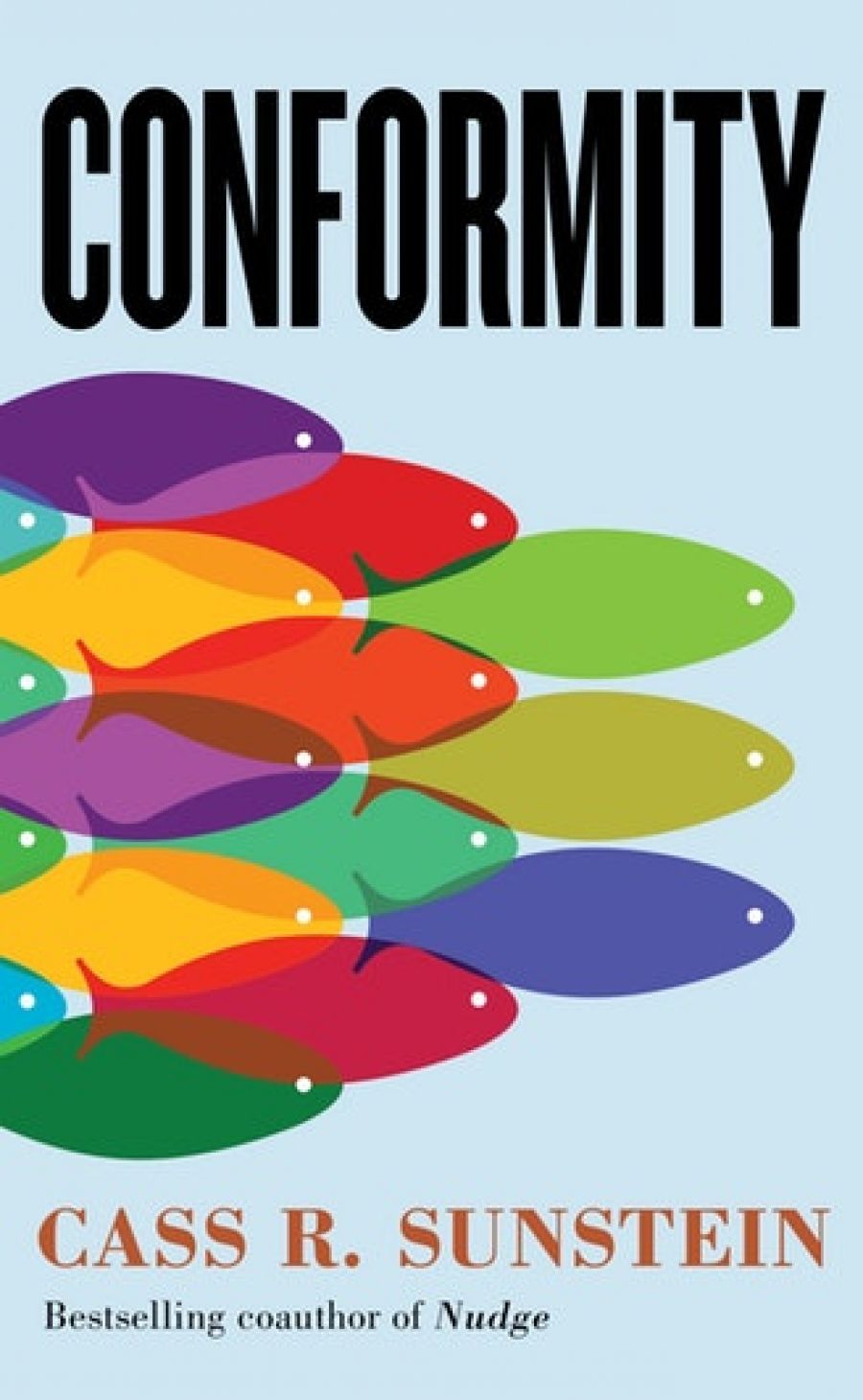
- Free Article: No
- Contents Category: Society
- Review Article: Yes
- Custom Highlight Text:
In Conformity: The power of social influences, the renowned constitutional scholar Cass R. Sunstein acknowledges that social conformity can provide the glue to bind a society together. As he makes clear, there are many particular norms – legal or moral – that we would do well to follow for the sake of the common good. At the same time, he argues, conformity can facilitate atrocities, destroy creativity, drive out nuance, conceal valuable information, and crush free-thinking individuals.
- Grid Image (300px * 250px):

- Book 1 Title: Conformity
- Book 1 Subtitle: The power of social influences
- Book 1 Biblio: New York University Press, $39.99 hb, 197 pp
As Sunstein elaborates, we need disclosers, people who dissent when they have something relevant to contribute, not contrarians, who dissent for a reward (financial, psychological, or otherwise). Disclosers should be especially prized if they offer important information that would otherwise not be available for discussion. However, it is not only missing facts that ought to be disclosed when groups deliberate, but also missing arguments and viewpoints, and missing signals of what the group’s members really want.
Throughout Conformity, Sunstein emphasises the dynamics of group polarisation and informational cascades. Group polarisation occurs when a group of people deliberating about an issue moves towards an extreme conclusion (while a different group might veer to the opposite extreme). Unfortunately, a group that begins by leaning in one direction will probably end up, after its deliberations, leaning even more strongly in that direction. Counterintuitive as it may seem, the group is likely to reach a position more extreme than the one with which it began. Varied factors play into this, among them an obvious rhetorical advantage in arguing for a hyperbolic version of the group’s original tendency (and a converse disadvantage for anyone who counsels moderation). Often, therefore, group members will egg each other on towards increasingly extreme positions. At the same time, they will devalue arguments and viewpoints from distrusted sources, even if those arguments and viewpoints have some objective merit.
Informational cascades take place when people cease to give weight to their own independent information, relying, instead, on a sequence of judgements by others who have already considered the issue (which might be anything from what music to buy today, to who should be offered a job, to the wisest response to a political crisis). As a variant, reputational cascades occur when dissent from judgements earlier in a sequence appears to be dangerous: it is likely to damage the reputations of people who dissent later in the sequence. Related to this are availability cascades, when an emotionally compelling example of a problem – perhaps a shark attack – grips imaginations and information about it then spreads rapidly, irrespective of the actual size of the problem. For example, sharks cause only a minuscule proportion of deaths in Western societies. Pointing this out, however, is likely to seem callous when there is social panic about a recent shark attack.
It can be difficult to tell what is motivating individuals in any particular situation: their own knowledge, reliance on others’ judgements, or fear for their reputations if they express dissent. It is healthiest for a group if its members are honest about their own information, experience, reasoning processes, preferences, and values, but this is risky and requires courage. Thus, the message from Conformity is not so much that we should all be braver and more outspoken – though perhaps we should be – as that our deliberative institutions work better when they build in rewards for honest dissent. Well-designed institutions not only protect dissenters but also advance the interests of others who might benefit if dissent is heard.
As a constitutional scholar, Sunstein is especially interested in the development of public policy, and in how courts interpret and apply the law. Accordingly, he studies the effect of conformity mechanisms when juries or panels of judges consider difficult cases, or when judges look to one another’s decisions as possible precedents. Some of the material in Conformity relates specifically to the American legal system, but the book as a whole has much wider implications – beyond the US and beyond courtroom settings. It helps explain the current levels of polarisation and incivility in public debate, not only in the United States but in contemporary democracies more generally. Useful though they are in many respects, social media and the internet intensify group polarisation and encourage decision-making via cascades.
Sunstein brings detailed, up-to-date knowledge of the social mechanisms that produce self-censorship, outward compliance, and sometimes an inner acceptance of extreme views. The result is a reliable book-length analysis of the pressures to conform and why they are a problem.


Comments powered by CComment